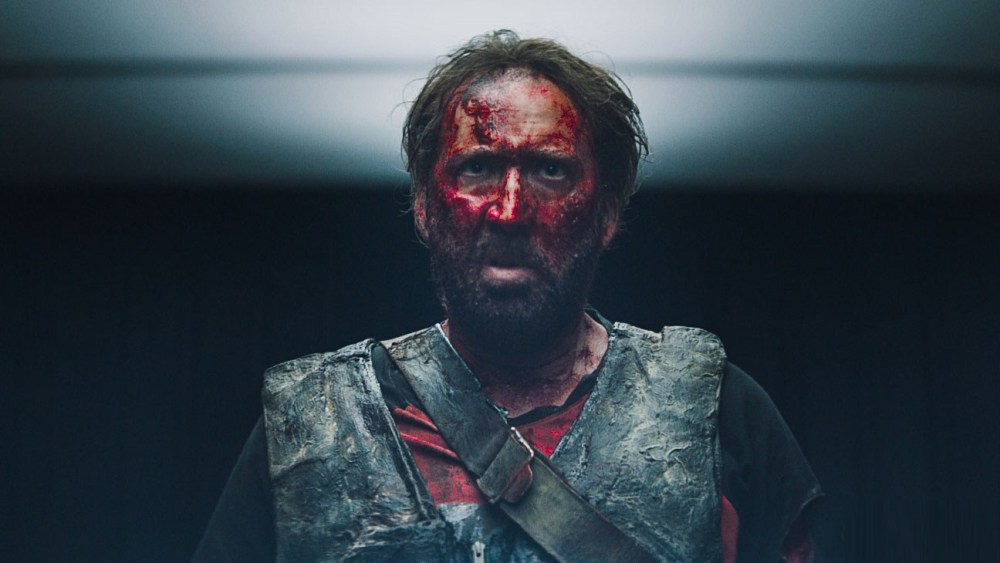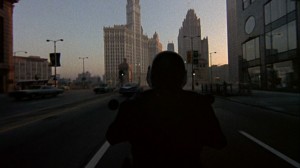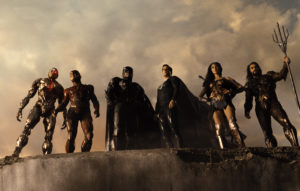
Mandy sees Panos Cosmatos emerge from the wilderness after nearly eight years away from the director’s chair with a singular bugfuck opus, a funereal doom metal double-album of crushing loss and cosmic fury. It’s every bit as beguiling and sensuous as his debut Beyond the Black Rainbow, retaining its druggy, sinister atmosphere and adding a bright red beating heart bruised by unknowable pain. It features a heavy, ear-splitting score by the late, great Jóhann Jóhannsson, a startling turn by living legend Nicolas Cage, and impressive work from cinematographer Benjamin Loeb, who bathes the whole mess of it in the oranges and ochres of a Fu Manchu record sleeve. To watch this movie is to chart the growth of a bold voice in genre filmmaking in real time as they etch pentagrams into their hall of fame plaque with a boar’s tusk.
The film opens with the smell of death on it. The first words onscreen are an epigram, left uncredited, but attributed elsewhere to Texas death row inmate Douglas Roberts. In his parting words to this realm, he asked that “when I die, bury me deep, lay two speakers at my feet, put some headphones on my head and rock and roll me when I’m dead.” This sets the tone for the level of cartoon metal violence Cosmatos and company have in store. But this is a feint. This time around, Cosmatos takes great care to ground the film emotionally before anything even remotely gonzo happens. And so from the jump, we are privy to the quiet life of Mandy and Red (Andrea Riseborough and Nicolas Cage, both superb), who live in a secluded cabin nestled in the depths of the Shadow Mountains. Their idyll is interrupted when cult leader Jeremiah (Linus Roache, slimy) summons a cadre of motorcycling marauders to kidnap Mandy, while his followers dose her with LSD and initiate her into their messianic sex cult. Only, in an awesomely defiant gesture, she laughs at his stupid dick and at his stupid touchy-feely soft rock fuck jams, but gets ritually burnt to a crisp for her trouble. And Red, gagged and bound to a shed with chicken wire, can only watch as his whole world burns to the ground. The cult only left a man for dead; what ends up coming for them is a force of nature.
Cosmatos has said in the press that Beyond the Black Rainbow and Mandy represent a duology of sorts, as both were conceived concurrently after the death of his parents, and both mirror a part of the emotional toll of the mourning process: Beyond the Black Rainbow is the way of repression, sterile and claustrophobic; Mandy is the way of expression, feral and anguished. And Cage is uniquely equipped as an actor to take this particular challenge on. The film’s structure enables him to work in three modes: soulful and tender, action-movie badass, and bad-acid Ender of Worlds. The shifts between these modes occur during two of the most remarkable sequences in the film. One is a post-horror bathroom meltdown that rivals Isabelle Adjani’s similarly-pitched acting solo in Possession in sheer primal scream wattage. The other is a lightning-quick hallucination that plays like a pocket version of the virtuosic 1966 sequence in Beyond the Black Rainbow. Cage is cannily aware of his current station as an actor, and being able to cycle between styles is proof positive that he’s not just aged into a ham. This is the first time in a long while that the material has been able to keep up with him.
Cosmatos’ only credits between Black Rainbow and Mandy are as an executive producer on the great VHS documentary Rewind This! and a special thanks mention on The Void, a similarly wild Lovecraftian horror film made by Canadian low-budget legends Astron-6. There’s a similar current of 80s revivalism in all four of these movies, but what makes Cosmatos’ work stand out is their idiosyncrasy. His grace notes don’t feel like they’re being ticked off a list. Mandy‘s strain of radness is the director’s own brew, marrying the stone tablets of 80s genre fare to Heavy Metal spreads, Bengal tigers, melting wax skulls, reverbed-out demon voices, absurd food commercials, sweet weaponry, gooey violence, four-wheelers, fog machines, and guitar riffs that can split a boulder in twain. There’s an unmistakable, unfakeable dorkiness to the project that, when played as straight as it is here, is intoxicating. But for all these bizarre touches, for all the weirdness, for how fucking rad it is, Mandy is a profoundly sad piece of filmmaking, existing in the vortex of anger and despair that invariably accompanies great loss.
—
Mandy had its Canadian premiere at the 2018 Fantasia International Film Festival.
Directed by Panos Cosmatos; written by Panos Cosmatos and Aaron Stewart-Ahn; starring Nicolas Cage, Andrea Riseborough, Linus Roache, Bill Duke, and Richard Brake; 121 minutes.



 Derek
Derek
 Isabelle
Isabelle